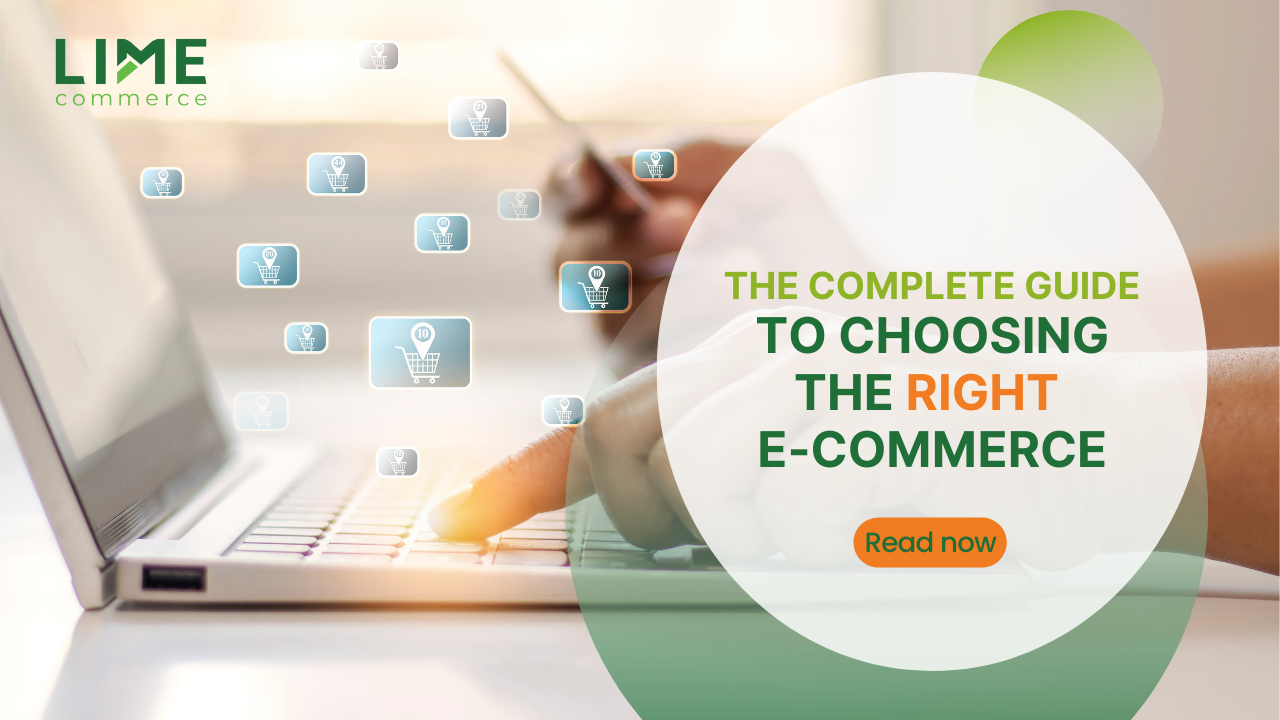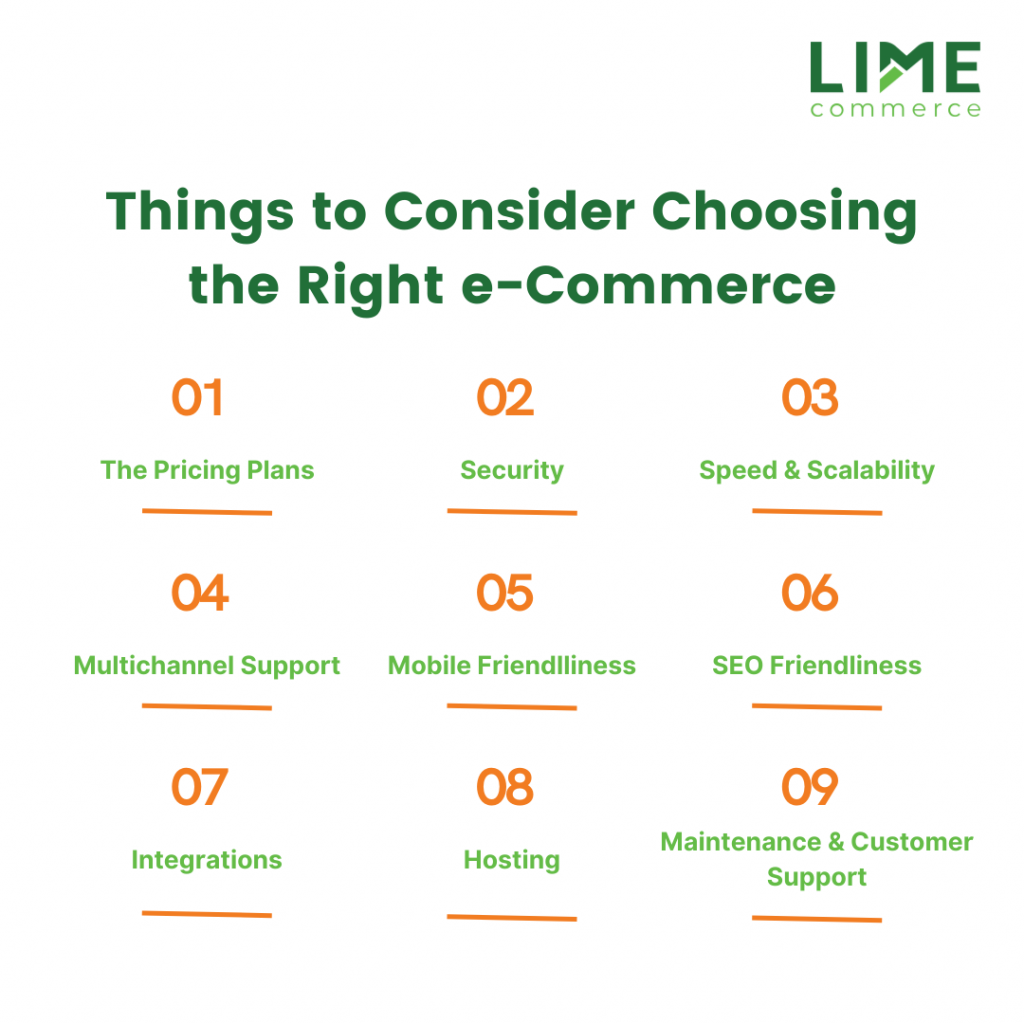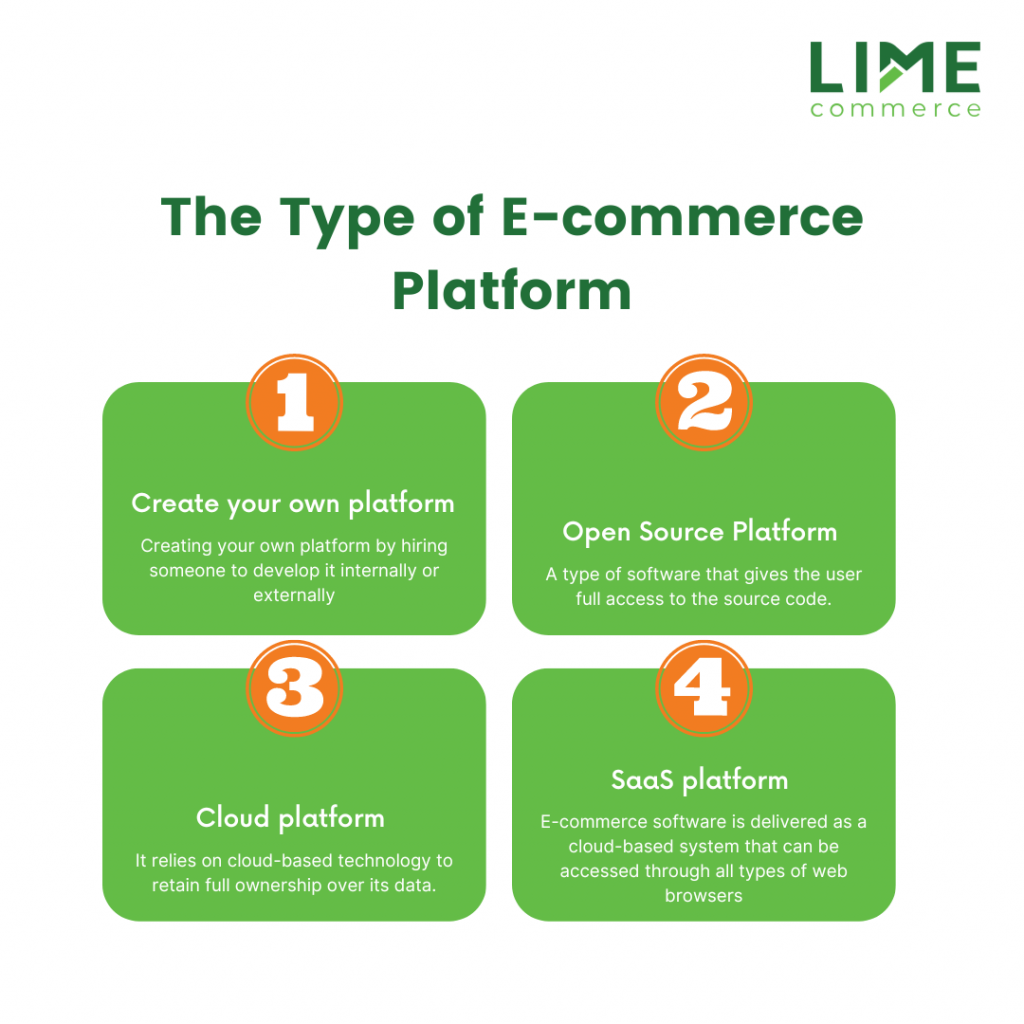
The Complete Guide to Choosing the Right E-commerce Platform
30 August 2022
By attalime
As a business owner, choosing the right e-commerce platform for your business is like building the right foundation for your home. It is the most fundamental thing for your business because it determines how much value your business can get from this platform. And there are tons of e-commerce platform in the market which offers different features, benefits, and costs.
Choosing an incompatible platform can lead to wasted budgets, additional costs, and lost growth opportunities. That’s why carefully choosing the right platform for your business can bring you multiple benefits and lead to endless possibilities in the future. These include creating a trusted online presence, delivering a great customer experience, rapid lead generation, and increased ROI.
And before we talk more about how to choose the right e-commerce in detail, let’s get familiar with the foundation of e-commerce platforms.
What is e-Commerce?
According to Investopedia, e-commerce refers to companies and individuals that buy and sell goods and services over the Internet. It operates in different market segments and can be conducted over computers, tablets, smartphones, and other smart devices.
But the reality, building e-commerce is not as easy as it may seem. It is so complex, and a lot of things to consider for businesses to use e-commerce. That’s why selecting the right e-commerce platform is a big job for the business.
Choosing an e-commerce platform based on its popularity is not the best way. The best eCommerce platform is the one that successfully delivers the outcomes and objectives you have set for your business. And the goals can vary for each business, such as increasing revenue, improving customer engagement, and entering or creating a new market.
Another criterion is that the right e-commerce platform should suit the team’s current technical expertise. For example, choosing an e-commerce platform that is very popular but has a high barrier to entry may not be suitable for a team with low technical expertise. In this case, you should build a technical team to achieve the ultimate business goal.
The Type of e-Commerce Platforms
There are four e-commerce platform options:
1. Create your own platform
The first type of e-commerce platform is creating your own platform by hiring someone to develop it internally or externally. Although it is possible, this is less common these days. However, this may be your only option if your business is a niche and you have specific needs and requirements that no commercial e-commerce platform can offer.
2. Open Source Platform
Another type of e-commerce platform is open source, where there is no upfront cost when purchasing a license. However, you will have to pay for initial development, implementation, ongoing development, upgrades, and migration. Magento Open Source is an example of an open-source e-commerce platform.
Also read: Magento Open Source vs Adobe Commerce, Which One is Best?
3. Cloud platform
Cloud e-commerce relies on cloud-based technology to retain full ownership over its data. It is one place to manage and scale data storage, hosting, and digital commerce applications such as virtual payments, inventory management, and product information management. Examples of cloud e-commerce platforms are Magento Enterprise Cloud, Demandware, Salesforce Commerce, and Volusion.
4. SaaS platform
Software as a service e-commerce platform is an e-commerce software delivered as a cloud-based system that can be accessed through all types of web browsers. It is typically sold on a subscription basis, so you can experience the same technology that covers server usage, maintenance, security, and upgrades.
The Importance of Choosing the Right e-Commerce
As mentioned above, building an eCommerce business is more than putting up your product listings on the web. It is more complicated and complex where you need to dive deep into the level of strategic thinking and planning.
An e-commerce platform is an all-in-one solution that empowers online businesses to seamlessly manage the website, marketing, sales, and operations at once. In order to achieve that, an online business needs a fast, flexible e-commerce platform to create memorable customer experiences, streamline operational efficiency, and create phenomenal growth opportunities. Choosing the best eCommerce platforms means you can make the perfect storefront for the business on a relatively modest budget.
When selecting the right e-commerce platform, your e-commerce site determines four things:
- Growth: How quickly can your business grow?
- Running costs: Including the cost of building your eCommerce platform and ongoing development and maintenance costs.
- Customer engagement: How you can control how your customers interact and engage with your business.
- Service: The right e-commerce platform will enable you to deliver the service, including support customer conversion, loyalty, and retention.
Things to Consider Choosing the Right e-Commerce
There are numerous e-commerce platforms available that offer similar features and functionalities. But no worries, here are some important factors to consider to make it easier to choose the right platform for your e-commerce business.

1. The Pricing Plans
The pricing plan is the first to consider when choosing an e-commerce platform. Whether you’re a small business just starting or an established brand with a physical store that goes online, you need to understand the total cost of each platform.
There is a monthly fee for almost all platforms. There are also processing costs associated with each platform. Don’t sacrifice what you need at a low price. But on the contrary, paying more doesn’t always equal the best experience. So make sure to nail down exactly what you need for your online store to avoid shiny object syndrome. Then you can also weigh the strengths and weaknesses of each option to get the best value for your budget.
And don’t forget to consider the best customer shopping and payment experience. Ensure that the e-commerce platforms offer third-party payments, multiple payment gateways support, and multiple shipping options. The incomplete feature will potentially cause significant inconvenience to customers and lead to the cart’s abandonment. You can also compare the shopping cart experience on each platform to see which is the most user-friendly for the customers.
2. Security
Security is one of the most important things to consider when choosing an e-commerce platform. Since e-commerce is a digital platform that actively accepts payments, you must ensure that your e-commerce provider has the required security protocols.
Protecting customer data and privacy has always been a top priority. So, always choose a platform that allows you to manage your payment processing and data securely. If you can provide this essential feature, your customer will see you as trustworthy e-commerce and turn them into loyal customers.
3. Speed and Scalability
As a business, you must hope your e-commerce business will continue to grow. Therefore, you need to choose a platform that can scale according to the size of your business. Also, the platform should not charge exorbitant fees to provide additional functionality and storage to meet growing business needs.
You must also consider that the platform can handle your traffic and data. How does each platform handle heavy traffic volumes, and how does it affect the website speed? Is it getting slower when heavy traffic? Or, no matter the traffic volume, the website speed can perform best.
4. Multichannel Support
It is no secret that e-commerce can increase sales and conversions by offering products or services through various sales channels. Therefore, you need to choose a platform that allows you to sell your products and services through multiple sales channels on social media, online store websites, and e-commerce simultaneously.
Shopify, WooCommerce, BigCommerce, Magento, and PrestaShop are multi-channel e-commerce platforms to help you create various sales options in your online marketplace and generate higher revenue by centrally managing your inventory data.
Also read: 15 Benefits of Magento Development Services for Business and How to Consider the Best Ones
5. Mobile Friendliness
You might know that consumers shop more often now with their mobile phones. That’s why you need to consider providing them with a mobile-friendly e-commerce system that makes your store look great on screens of all sizes. Besides, consider the mobile features you need based on your product or service and ensure your website engages customers on a small screen.
6. SEO Friendliness
Let’s face the reality that 93% of online activities start with a search, and keywords are everything. And as a business, surely you want your customers to find you immediately. Therefore you need built-in SEO tools that are great for spotlighting your search.
And you need to be excellent in some areas of your website compared to your competitor to be displayed on search engines. And when you have the right website tools, it’s easy to conquer Google search. Besides, you can also add a blog to your website to increase the conversion rate of your customers.
7. Integrations
The e-commerce platform has everything you need to run your e-commerce business. Still, integrations and plugins must be added to the platform to provide key features such as tax calculators, payment gateways, accounting, email marketing tools, and shipping apps. However, you better choose a platform with an active community that supports business-related integrations and plugins and constantly works to improve the platform and solve problems.
8. Hosting
Another essential thing to consider is hosting. If you choose SaaS e-commerce platforms, you will get help to remove much of the complexity of running an online business, such as hosting. And there are two ways e-commerce sites can be hosted, i.e., self-hosted, which requires online store owners to find hosting, deal with installations, and often perform software updates manually. The other is cloud-hosted, which offers web hosting as part of your monthly subscription. It means you don’t have to look for third-party hosting or address administrative challenges.
9. Maintenance and Customer Support
Building an e-commerce website is not just a one-time fee. Keep in mind that you have to pay to keep the site running and to keep everything running smoothly. One example is domain names have an annual cost unless you can pay them for several years upfront, which is costly. Another thing is you will also need to pay for hosting unless it is included in your hosting costs on your e-commerce platform. And there is the annual SSL certificate fee to consider.
And don’t forget the customer support. Because for e-commerce, you must ensure that your system is in the most satisfactory condition to provide a high-quality service. Once you have a system malfunction, it can affect your sales, even if it is not your fault. That’s why you also need a shop platform supported 24/7 in an emergency.
Pro Tips to Choose an e-Commerce Platform
To remain competitive in the market, you should choose e-commerce software with advanced platform-specific features at no extra charge. With that fact in mind, let’s take a closer look at his four pro tips to help business owners find the right platform for their e-commerce business.
-
Ask the right questions
When you are asked what to do first to choose the right e-commerce platform, you should be prepared with a set of right questions that will help you make the right decision for your store. Asking the right questions is essential because it will help you receive the information you seek and avoid confusion or other issues as well. Ask as many specific questions as you want and listen for a specific answer.
Then you might be confused about what kind of the right questions to ask vendors or e-commerce platform providers. Here are the questions that help you get the information you seek and make a better decision.
| Pricing | What are your monthly fees? |
| Are fees fixed, or do they fluctuate based on traffic/sales? | |
| Do you take a percentage of our revenue? | |
| Can we upgrade or downgrade our plan easily? | |
| What is the term of the contract? | |
| Are you offer reliable hosting solutions? | |
| Integrations | Can we use APIs to build custom integrations? |
| Is it offers integrations with additional applications? | |
| SEO | Do you support sitemaps for Google? |
| Do you support search engine-friendly URLs? | |
| Do you support URL rewrites giving full control of URLs? | |
| Do you support meta-information for products, categories, and content pages? | |
| Can your platform auto-generate sitemaps for display on site? | |
| Mobile | Does your platform support mobile-responsive templates/themes? |
| Do you have Google AMP support, or can we achieve AMP compliance with your platform? | |
| Is your checkout system mobile-friendly? | |
| Is it optimized for mobile devices and allows us to customize it easily? | |
| Support | Will we have 24/7 access to a support team? |
| Is there any extra cost for the support team? | |
| How quickly does your support team respond to online chats, emails, or calls? | |
| Will you need to find answers to your problems from a community of existing users? | |
| Security | What technology do you leverage to minimize the risk of cyber-attacks? |
| Can you provide a history of your security track record? | |
| What protocols do you follow in case of a breach or attack? | |
| Scalability | Do you have multi-site support? |
| Do you have multi-tenancy support? | |
| Do you leverage cloud computing? | |
| Product Catalog & Marketing | Is there a limit to the number of products you can sell? Are there any transaction fees? |
| Can we offer multiple product options (like different colored shirts)? How simple is that to manage? | |
| Can we create different price points for different customer groups, such as wholesalers and retailers? | |
| Is it support for both physical or digital products? | |
| Can we display related products to upsell and cross-sell? | |
| How do coupon codes work? Can we apply pricing rules and dynamic coupons to restrict coupons to certain stores, customer groups, time periods, products, and categories? | |
| Can we offer multi-tier pricing? | |
| Are you offering resources (e.g., blog) to educate on how to sell online and grow the business over time? | |
| Shipping & Payment | Can we offer multiple shipping options? |
| Can your platform integrate with our shipping software? | |
| Can we offer collection as a shipping option? | |
| Can we offer one-page checkout? | |
| Can we offer a guest checkout? | |
| Can we offer the option for account creation at the beginning of checkout? | |
| What payment options do you have (ex., payment gateways like Paypal, credit card, etc.)? How much do they cost? | |
| Other Features | Does your platform support a user-friendly/intuitive page layout? |
| Does the search function capture products similar to the one searching for, doesn’t require exact spelling, and suggests similar products for customers? | |
| Can the platform support the ability to display more than one image of each product? | |
| How do you manage inventory? | |
| Is it allows us to sell directly to customers on Facebook, eBay, Amazon, and other marketplaces, without managing separate inventories? | |
| Is built with advanced native functionality and UX features? | |
| What are your options for themes? How customizable are those themes | |
| Can we control multiple websites and stores from one administration panel? | |
| Can we set user permissions and roles? | |
| Does your platform generate a sales report? |
-
Start a free trial
In order to get the answer to your business needs and requirements, there is no harm in connecting with sales and support staff to get your burning questions answered and test out features by starting a free trial.
Since you will be using this eCommerce platform for the long term, this isn’t a decision to take lightly. A free trial is a smart move to see whether or not the platform will be a good fit for your online store and at no monetary loss for your business.
-
Test store functionality
When it comes to usability, we want to get the job done without learning a lot of programming or more advanced technical knowledge. It means the platform needs to be easy to navigate, set up properly, and used for long periods.
-
Determine the scalability of the e-commerce platform
Business growth and scaling up is the main goal and objective of an entrepreneur or business owner. It can be achieved with well-designed planning and strategy. As time goes by, the business will grow and need additional support from its e-commerce platform.
That’s why business owners also need to determine how well the e-commerce platform integrates with other technologies, provides scalability, and allows customization. On that note, don’t let a lack of fast technology limit your business success.
The Takeaways
There are many platforms you can choose from with their pros and cons. But with the guide above, you should be able to evaluate all the key aspects of an e-commerce platform and consider this in choosing an e-commerce platform to avoid the mistakes and pitfalls that could cost you dearly in the long run.
Choose the platform that continually invests in its technology and stays ahead of the competitors. However, e-commerce is much more than a tool to sell your products, but it can be your vehicle for strengthening and elevating your business’s journey to the future. It could lead your business to an #endlesspossibilities.
Still in doubt about choosing the right e-commerce platform? We are Lime Commerce, an e-commerce developer agency with more than eight years of experience building high-quality online stores using the best industry practices. Please contact us to discuss your needs or expectation and how we can make endless possibilities for your business.

